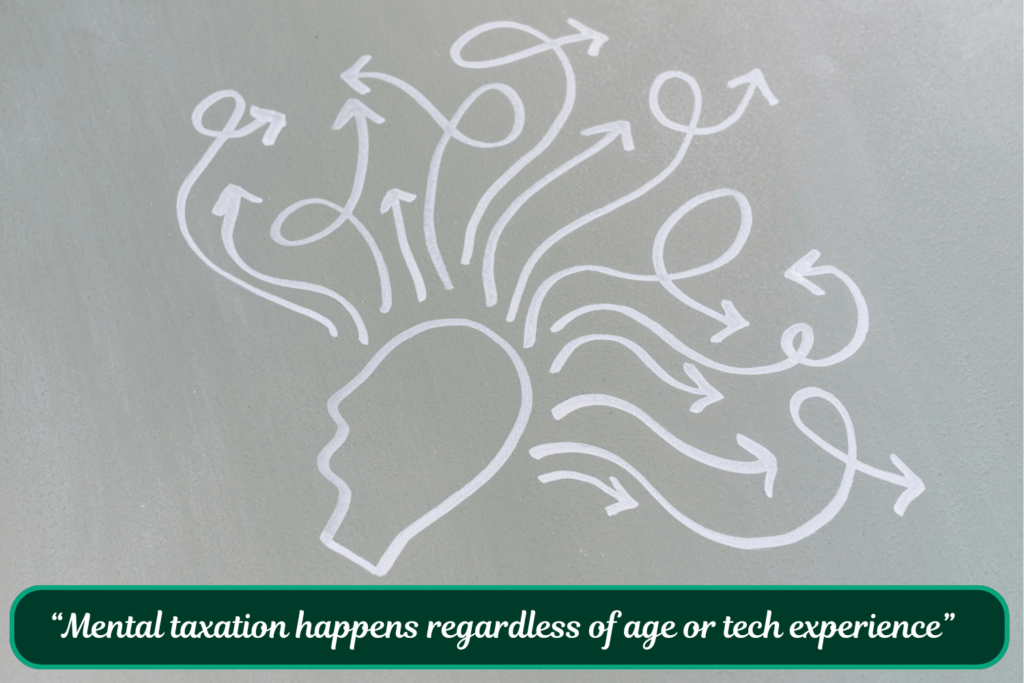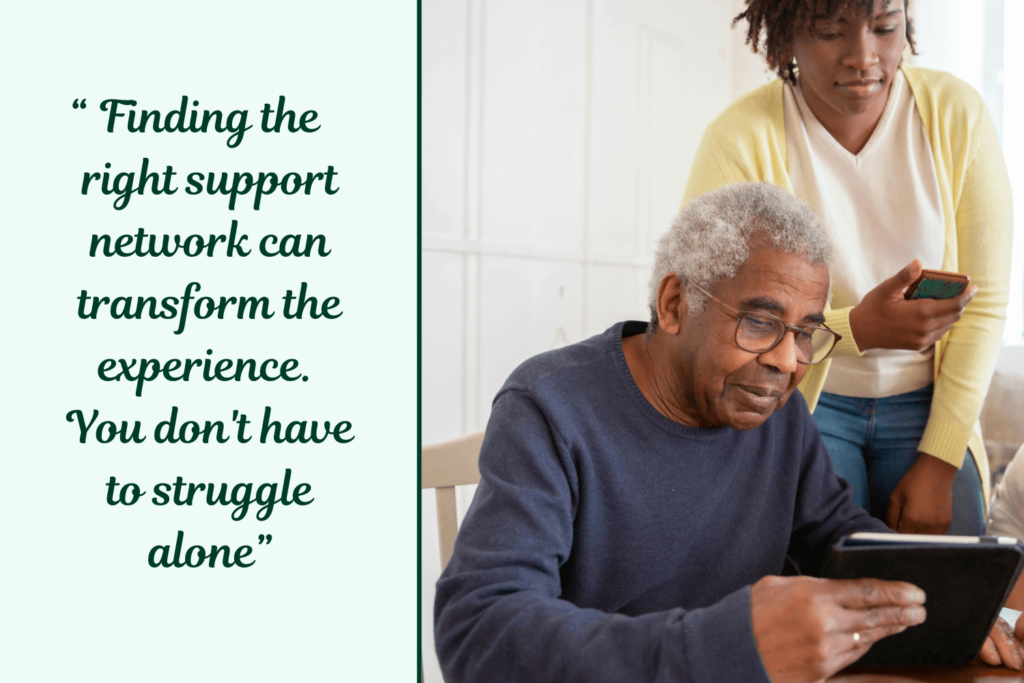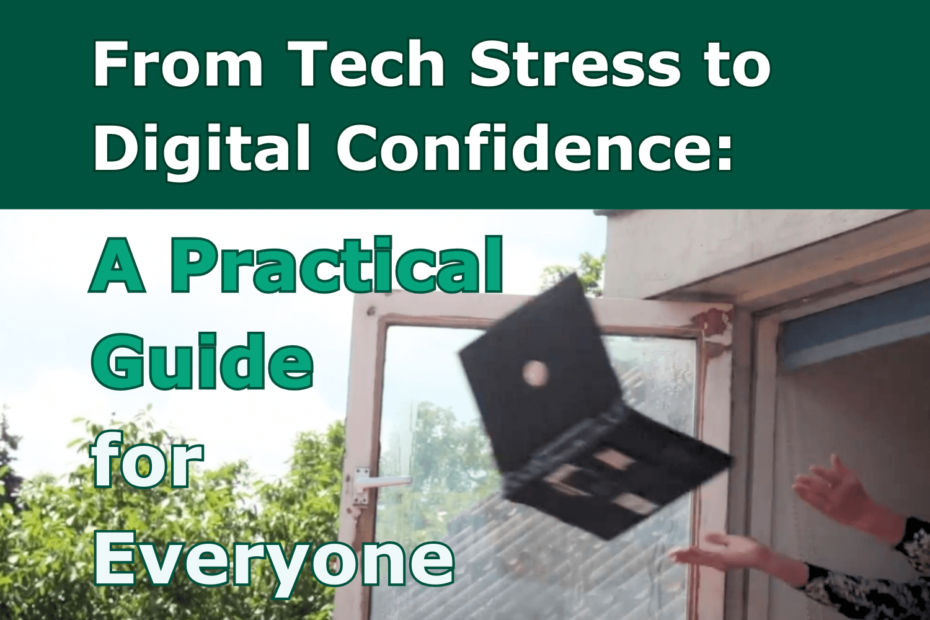Ever caught yourself sighing deeply when facing yet another password reset? Or felt that surge of tech stress when an app update moves everything you’d finally learned to navigate?
These aren’t signs of personal inadequacy—they’re normal responses to a digital environment that often prioritises novelty over usability.
In our work providing technology help to clients of all ages, we’ve discovered something fascinating: tech stress affects almost everyone, regardless of age or experience level. The difference isn’t who feels it, but why and how they experience it.
Let’s explore what’s really happening when technology makes you anxious—and how you can transform that experience into genuine digital confidence.
The Acceleration Gap: Source of Modern Tech Stress
Here’s something they don’t advertise: nobody is keeping up with technology. Not completely. Not even the people designing it.
The pace of technological change has created what researchers call an “acceleration gap”—the distance between how quickly technology evolves and how quickly humans can adapt to those changes. This gap creates tech stress for everyone from millennials to retirees.
What’s unique about today’s technological landscape isn’t just its complexity—it’s the constant state of flux. Just as you master one system, it changes. This creates a particular kind of friction that can wear down your digital confidence over time.

Mental Load: When Your Brain Hits Its Bandwidth Limit
Have you ever felt mentally exhausted after navigating a poorly designed website or troubleshooting a new device? That’s cognitive load in action—a significant contributor to tech stress.
Our brains have finite processing capacity. When interfaces require us to remember multiple steps, decipher unclear icons, or navigate without sufficient feedback, they consume mental resources rapidly.
This mental taxation happens regardless of age or tech experience. The difference is that when you’ve been using familiar systems for years and they suddenly change, the mental recalibration required can quickly deplete your reserves of digital confidence.
The Upgrade Treadmill: Forced Change Creates Tech Stress
“I was perfectly happy with my current system. Why am I being forced to change?”
This sentiment crosses generational lines but becomes particularly frustrating when you’ve invested time finding systems that work for you, only to have them rendered obsolete.
Consider how many essential services have migrated online in recent years:
- Banking and financial management
- Government services and tax filing
- Healthcare scheduling and records
- Community connections and events
This isn’t just about preference—it’s about agency. Being compelled to adopt new technology not by choice but by necessity can create legitimate tech stress and erode your sense of digital confidence.
The Privacy Calculation: Security Concerns in the Digital Age
Today’s digital privacy concerns aren’t just the domain of the tech-resistant—they’re increasingly mainstream across all demographics.
Many people are understandably cautious about:
- The permanence of their digital footprint
- The security of their financial information
- The accumulation of data about their habits and preferences
- The potential for identity theft and fraud
What’s fascinating is how different generations approach these concerns. Those with experience in both analog and digital worlds often have valuable perspectives on privacy that can actually enhance digital confidence once properly addressed.
Breaking the Tech Stress Cycle: Your Path to Digital Confidence
The good news? Tech stress isn’t inevitable. Better yet, addressing it often leads to a more intentional and satisfying relationship with technology.
Here’s how you can begin your journey toward genuine digital confidence:

1. Embrace Strategic Patience to Reduce Tech Stress
Technology has trained us to expect immediate response. This expectation is actually quite new—and often unrealistic.
Try this mindset shift: When technology doesn’t respond instantly, it’s not necessarily reflecting on your abilities. Sometimes the most tech-savvy response is simply to wait a moment before taking further action.
This simple practice can significantly reduce your tech stress and build confidence by putting you back in control of the interaction.

2. Adopt Intentional Technology Choices
What if your relationship with technology became more deliberate?
Consider asking:
- “What technology genuinely enhances my life?”
- “Which digital tools give me more than they take?”
- “Where do I want to invest my learning energy?”
This selective approach isn’t about limiting yourself—it’s about curating a digital environment that serves your priorities rather than creating unnecessary tech stress.

3. Find Your Digital Allies for Personalized Technology Help
Tech stress feels most overwhelming when faced alone. Finding the right support network can transform frustration into digital confidence.
This might include:
- Friends who share similar learning journeys
- Community groups focused on specific technologies
- Professional technology help services that understand both the technical and human aspects of learning
The right digital allies don’t just solve problems for you—they provide technology help that empowers you to develop your own understanding at a comfortable pace.

4. Rewrite Your Technology Narrative to Build Digital Confidence
The stories we tell ourselves about our relationship with technology powerfully influence our experiences with tech stress.
If you catch yourself thinking “I’ll never understand this” or “Technology just isn’t for me,” consider whether these narratives are undermining your digital confidence.
Alternative perspectives might include:
- “I’m selectively mastering the technologies that matter to me”
- “Learning new systems takes time for everyone”
- “My experience gives me valuable perspective on which technologies are actually useful”

5. Take Empowered Privacy Steps
Rather than feeling victimized by privacy concerns, experience the satisfaction of taking informed control:
- Understand which privacy settings actually matter
- Learn to recognize genuine security threats
- Make conscious decisions about where to share information
- Create systems that protect what’s important to you
The right technology help can transform these concerns from sources of tech stress into opportunities to build digital confidence.
Your Invitation to Digital Confidence
The path to overcoming tech stress isn’t about becoming someone else—it’s about bringing your existing wisdom, perspective, and goals into your digital life.
With thoughtful choices, the right technology help, and a bit of patience with both yourself and your devices, technology can transform from a source of tech stress to a genuine enhancement to your existing capabilities.
Every technology expert was once a beginner. The difference isn’t innate talent—it’s having appropriate technology help, focusing on what matters to you personally, and bringing your life experience to this new domain.
At Hebden Tech Tutors, we believe technology should adapt to human needs, not the other way around. We’d love to be part of your journey from tech stress to digital confidence, whatever that looks like for you.
After all, the real win isn’t mastering everything—it’s finding and using technology that actually makes your daily life better, with the digital confidence to use it on your own terms.
Find out more about what we can do for you!
About The Author:
- Windows 10 is Retiring Soon - April 22, 2025
- Taking Control of Your Online Privacy with Brave Browser - April 8, 2025
- Finding Peace in a World of Pings: How to Use Technology Without It Using You - March 19, 2025
